 (21 April 2013) Stocks slumped on most global markets last week on weaker economic data coming out of China and Germany. US stocks lost 2% on the week with the Dow closing at 14,547. Indian stocks fared better, however, as falling commodity prices and the anticipation of fresh inflows of Japanese capital encouraged investors to buy. The Sensex climbed 4% finishing the week at 19,016. I had been somewhat bearish in last week’s forecast given the Sun-Mars conjunction that came exact on Thursday. This assessment proved to be plausibly correct as the low for the week on many exchanges occurred on Thursday.
(21 April 2013) Stocks slumped on most global markets last week on weaker economic data coming out of China and Germany. US stocks lost 2% on the week with the Dow closing at 14,547. Indian stocks fared better, however, as falling commodity prices and the anticipation of fresh inflows of Japanese capital encouraged investors to buy. The Sensex climbed 4% finishing the week at 19,016. I had been somewhat bearish in last week’s forecast given the Sun-Mars conjunction that came exact on Thursday. This assessment proved to be plausibly correct as the low for the week on many exchanges occurred on Thursday.
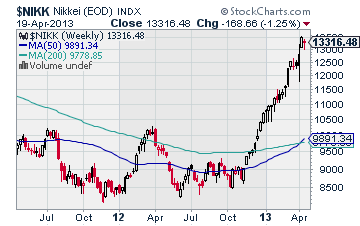 Despite rising fears of another slowdown, the Bank of Japan’s latest monetary easing efforts were applauded by the G20 and IMF last week as necessary for halting that country’s deflationary spiral. The powers-that-be are naturally supportive of any and all forms of central bank easing as the loose monety policies keep the current asset bubble inflated and thereby prolong the shell game for that much longer. Not surprisingly, the Japanese stock market has responded favourably to this easing initiative. Japanese stocks have rallied more than 50% since their November lows. Part of this was due to the global rally in equities, but stocks got an added boost from the Bank of Japan’s announcement in January that it will buy $70 Billion per month of long term government debt. Taking a page from the Fed’s playbook, the BOJ wants to encourage capital to find other more productive avenues for investment outside of safe government-issued debt. Haruhiko Kuroda and his central banker colleagues hope that this shift into riskier assets will stimulate economic activity and therefore boost prices in an effort to end Japan’s current deflationary morass.
Despite rising fears of another slowdown, the Bank of Japan’s latest monetary easing efforts were applauded by the G20 and IMF last week as necessary for halting that country’s deflationary spiral. The powers-that-be are naturally supportive of any and all forms of central bank easing as the loose monety policies keep the current asset bubble inflated and thereby prolong the shell game for that much longer. Not surprisingly, the Japanese stock market has responded favourably to this easing initiative. Japanese stocks have rallied more than 50% since their November lows. Part of this was due to the global rally in equities, but stocks got an added boost from the Bank of Japan’s announcement in January that it will buy $70 Billion per month of long term government debt. Taking a page from the Fed’s playbook, the BOJ wants to encourage capital to find other more productive avenues for investment outside of safe government-issued debt. Haruhiko Kuroda and his central banker colleagues hope that this shift into riskier assets will stimulate economic activity and therefore boost prices in an effort to end Japan’s current deflationary morass.
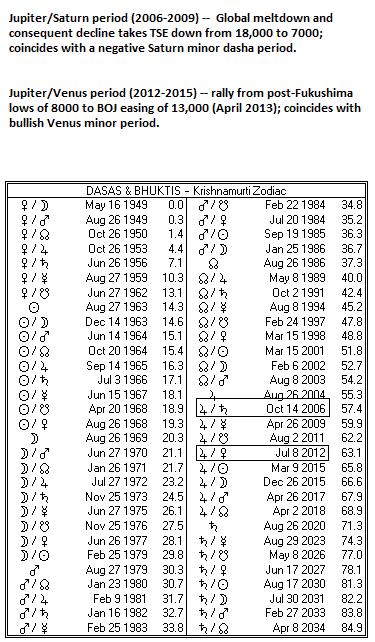
The astrology of Tokyo stock exchange chart reveals why the current easing policy is enjoying such remarkable success. Since July 2012, this horoscope has been running the Jupiter-Venus dasha period. Both of these planets are natural benefits so that increases the probability for gains during this period. To be sure, Jupiter is somewhat mixed since it is debilitated in Capricorn in this chart. Indeed, the TSE/Nikkei has struggled at times since the beginning of the Jupiter period in 2004 which includes the catastrophic 2008 financial meltdown. Significantly, the meltdown occurred during the Jupiter-Saturn dasha period. Saturn, of course, is a much more bearish influence so it is appropriate that the market would fall sharply at that time.
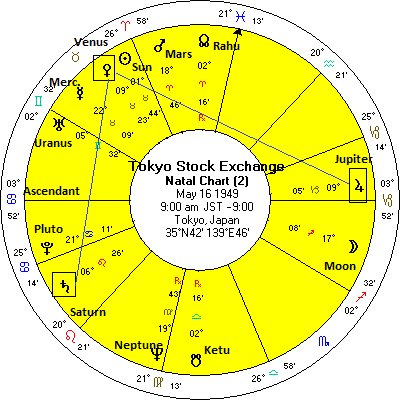
But the Venus minor period is arguably more important than Jupiter for reflecting the dominant price trend. Venus is a natural benefic but it is also very strong in this natal chart. Venus is placed in its own sign of Taurus in the 11th house of gains (!) and receives a near-exact trine aspect from benefic Jupiter. It may well be the most powerful planet in the entire chart. In July 2012 when the Venus minor period began, the Nikkei was testing its post-Fukushima lows around 8000. Since that time, it has consolidated into a strong base and then rallied almost parabolically since November 2012 and is now above 13,000.
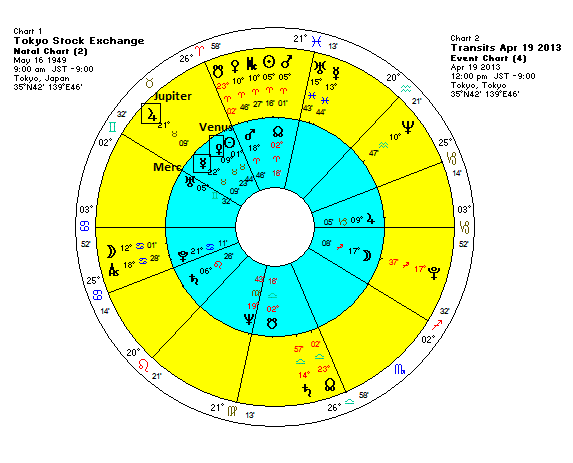
As an additional correlative factor, transiting Jupiter has been conjunct Venus in Taurus since mid-2012. This is an additional boost to the minor dasha lord Venus and thus is another reason why prices have been so bullish in Japan recently. Jupiter is due to conjoin Mercury, its last planet in Taurus, in the next week or so. After that, it may be less effective in creating optimism for stocks.
But what happens when transiting Jupiter leaves Taurus and enters Gemini in June where it will remain for the next year or so? This is one reason why the current rally is likely to pause and perhaps suffer some kind of correction. Jupiter is less bullish in Gemini which is the 12th house in this horoscope. Therefore is quite normal that stocks would pullback to some extent given the intense and unsustainable rally that Japanese stocks have experienced in recent months. We are therefore more likely to see some declines in Japanese stocks in the next few months. But given the strong placement of Venus in this chart, we should expect Japanese stocks to stay mostly bullish for the duration of its Venus minor period until March 2015. Therefore, any corrections are less likely to do lasting damage to the overall bullish picture in Japanese equities. Corrections are therefore more likely to be buying opportunities as the Nikkei may well move higher in the medium term.
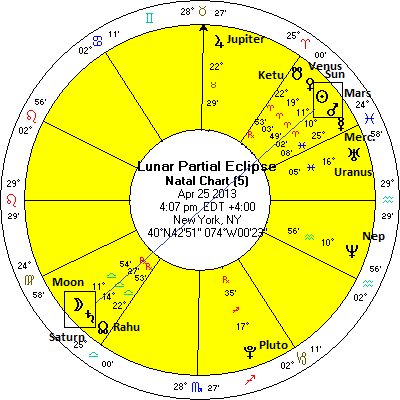
The focus this week is on Thursday’s lunar eclipse in sidereal Aries. Eclipses are traditionally seen as disruptive and malefic in their effects as the Sun or Moon is subject to sudden changes in their light due to the interplay of Rahu and Ketu. In my experience, eclipses tend to be bearish (but not always) and are also more likely to correlate with trend reversals. This particular lunar eclipse looks quite difficult since Mars is conjunct the Sun and Saturn is conjunct the Moon. The presence of these two first-class malefics around the Sun-Moon opposition should be seen as an added risk factor this week. That said, eclipses do not always manifest their effects immediately. With a solar eclipse due on May 9th, this two week eclipse period could see some very interesting developments in the markets.
You can be notified of new forecasts
if you follow MVA on Twitter.
investor newsletter which can be subscribed to here.
Please read my Disclaimer
Market forecast for week of 15 April 2013
Market forecast for week of 8 April 2013
Market forecast for week of 1 April 2013
Market forecast for week of 25 March 2013
Market forecast for week of 18 March 2013
Market forecast for week of 11 March 2013
Market forecast for week of 4 March 2013
Market forecast for week of 25 February 2013
Market forecast for week of 18 February 2013
Market forecast for week of 11 February 2013
Market forecast for week of 4 February 2013
Market forecast for week of 28 January 2013
Market forecast for week of 21 January 2013
Market forecast for week of 14 January 2013
Market forecast for week of 7 January 2013
Market forecast for week of 31 December 2012
Market forecast for week of 24 December 2012
Market forecast for week of 17 December 2012


